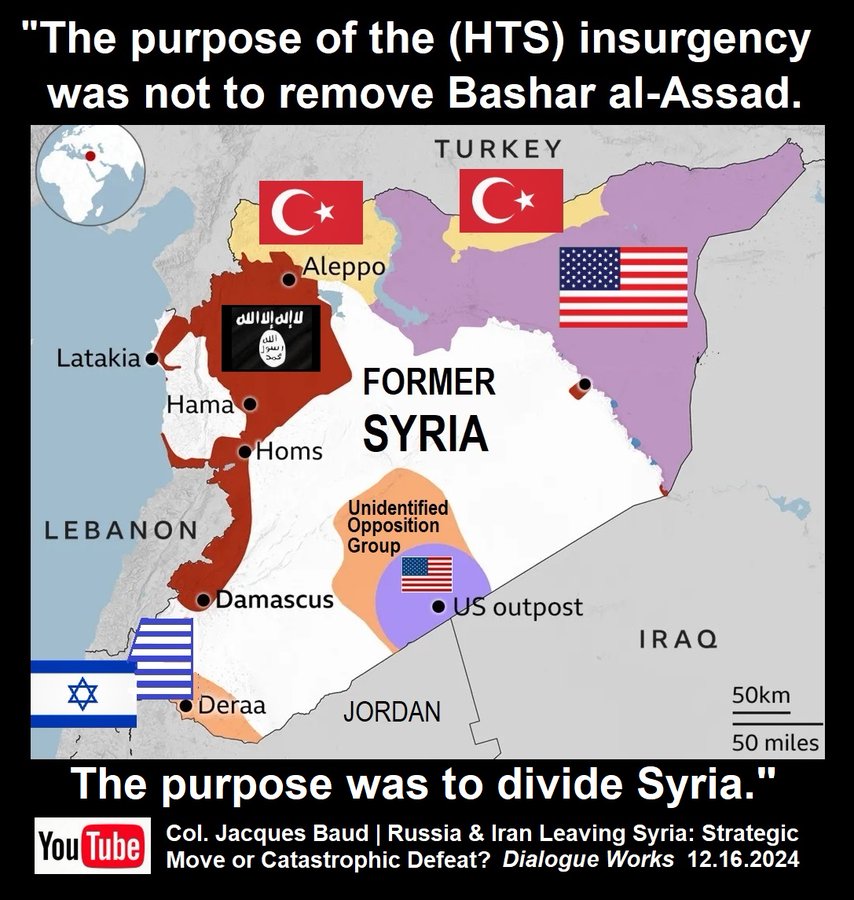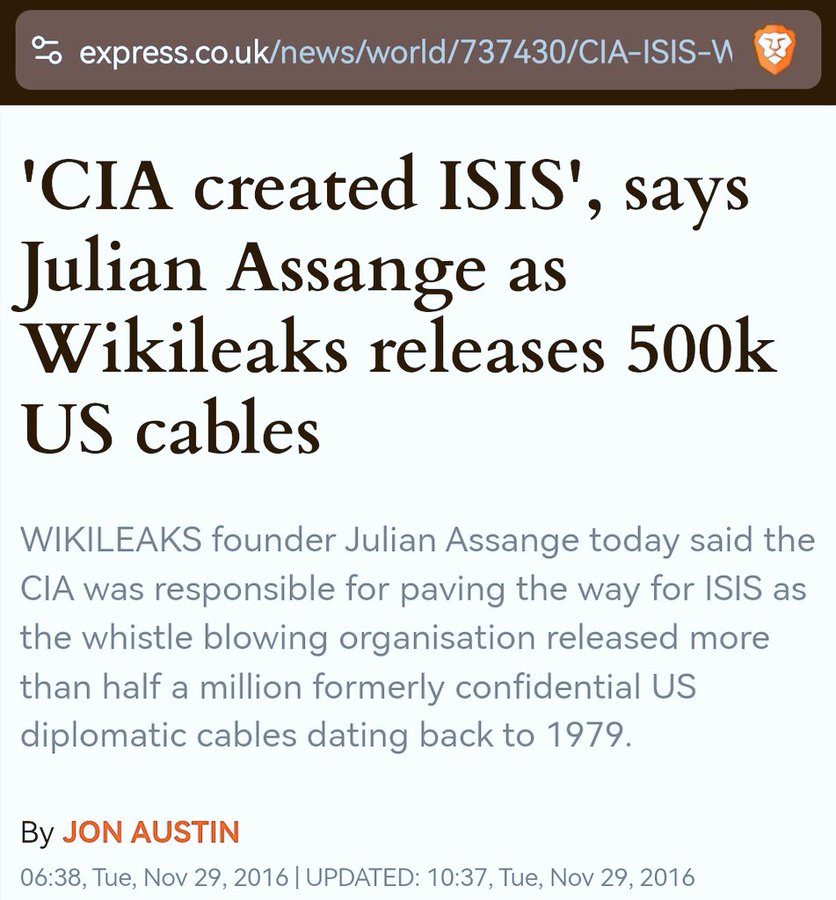The Syria Carve-Up Creates a de-Facto Israel-Turkey Border Ensuring a Broader ME War
SYRIA IN CONTEXT, 13 Jan 2025
Mike Whitney | The Unz Review – TRANSCEND Media Service
One Plan To Guide Them All: “…..The dissolution of Syria and Iraq... into ethnically or religiously unique areas… is Israel’s primary target… while the dissolution of the military power of those states serves as the primary short-term target. Syria will fall apart in accordance with its ethnic and religious structure… Oded Yinon, A Strategy for Israel in the Nineteen Eighties.
6 Jan 2025 – Israeli military forces have moved to within 15 miles of the Syrian Capital of Damascus. The IDF has seized large tracts of land in southern Syria it intends to occupy and where it will eventually build checkpoints, military outposts and settlements. The “lightening” invasion has been accompanied by a massive bombing campaign that has obliterated numerous military bases, weapons depots and research labs eliminating any hope that Syria will regain the ability to defend itself or to reestablish its sovereign independence. For all practical purposes, Syria no longer exists; the persistent attacks of foreign enemies have left the country vanquished and splintered. The carve-up of the critically located nation-state has already begun.
At the same time the IDF is closing in on Damascus, US Forces along the Turkish border have started building a military base in the city of Kobani. The move is intended to provoke Turkey into a confrontation that will pit Washington’s Kurdish proxy militia against the Turkish-backed Syrian National Army (SNA). The situation is fraught with danger as it increases the likelihood that two NATO members will soon clash in northeastern Syria.
Here’s more from an article at the Daily Sabah:
The United States is reportedly building a military base to help its ally the YPG, the Syrian offshoot of the PKK terrorist group, in northern Syria where the terrorists have been cornered by the Türkiye-backed Syrian National Army (SNA) since the fall of Bashar Assad’s regime.
Local journalists said 13 trucks with U.S. flags and carrying concrete construction blocks arrived in the PKK/YPG’s stronghold Ain al-Arab, also known as Kobani, early on Thursday morning. The U.S. military has emptied a base in neighboring Iraq and the concrete blocks and other materials are being shipped to Ain al-Arab for a Syrian base, according to local sources. Earlier this week, the U.S. military transferred dozens of Bradley armored vehicles to the region and supplied air defense systems and other armored vehicles to the YPG….
The PKK is proscribed as a terrorist group by the European Union, the U.S. and Türkiye. It is responsible for more than 40,000 deaths in Türkiye, including women and children. It maintains strongholds in northern Iraq and Syria to create a self-styled “Kurdish state.”
The U.S. has dispatched troops along with military equipment and weapons to Syria’s northeast during the Syrian civil war to help the PKK/YPG under the pretext of the fight against Daesh. Ankara says the YPG/PKK is on par with Daesh and should have no presence in the new Syria. US said to set up military base in Syria as SNA corners PKK/YPG, Daily Sabah
The excerpt above helps to show just how tense the situation in Syria is at the present time. While Washington applauded Turkey’s support for the jihadists who just toppled Assad and seized power in Damascus, the Biden administration is deliberately provoking President Recep Tayyip Erdogan on a critical matter of national security. (Turkish leaders regard US support for the Kurds (YPG) as a threat to their security.) This duplicitous behavior is not uncommon for the US which operates on the theory that allies are only allies for as long as they serve Washington’s overall interests.
The US will continue to support the Kurds (aka—The Syrian Democratic Forces or SDF) in order to preserve access to Syrian oil in the East, and to further reinforce its support for Israeli policy in the region. Israel’s affection for the Kurds is purely pragmatic as this excerpt from an article at CNN explains:
…there is one regional power that has thrown its weight behind the Kurds’ drive for independence: Israel….Israeli Prime Minister Benjamin Netanyahu released a statement ahead of the referendum saying Israel “supports the legitimate efforts of the Kurdish people to attain a state of its own.”… “Israel would welcome another state in the region that shares its concerns about the rising power of Iran, including the threat of Iranian-backed Shia militias in Iraq,” says Frantzman. “Reports have also indicated that oil from Kurdistan is purchased by Israel.” CNN
So, aside from getting cheap oil from Kurdish-controlled area in east Syria, Israel also sees the Kurds as a natural ally in their fight against Iran, Iraq, Turkey and Syria, all of whom oppose an independent Kurdish state. Here’s more background from an article at Al-Monitor:
The Kurdish-led Autonomous Administration of Northeast Syria has signed an agreement with an American oil company... One of the sources said the agreement to market oil in territory controlled by the US-backed entity and to develop and modernize existing fields was inked last week “with the knowledge and encouragement of the White House.”…..
Oil is the autonomous administration’s principal source of income.... The Kurdish-led entity controls most of Syria’s oil wealth, which is concentrated in and around the Rmelain fields close to the Turkish and Iraqi borders and in the Al-Omar fields further south.
Ankara is every bit as sensitive about the oil as it’s seen as the vehicle for cementing the Syrian Kurds’ self-rule project. Turkey has since 2016 been launching military operations against the SDF to disrupt its perceived attempts to establish a contiguous zone of control from the Iraqi border all the way to Afrin to the west of the Euphrates river and beyond. Turkey claims the SDF and its affiliates are “terrorists” because of their links to the outlawed Kurdistan Workers’ Party, the rebel group that has been fighting for Kurdish self rule inside Turkey since 1984 and is on the State Department’s list of terrorist organizations.
Sources told Al-Monitor the agreement to market oil in territory controlled by the US-backed Syrian Democratic Forces was signed “with the knowledge and encouragement of the White House.” Al-Monitor: US oil company signs deal with Syrian Kurd, justiceforkurds.org
Some readers may recall that President Donald Trump boasted many times how he “took the oil” in Syria. Here’s what he said:
I left troops to take the oil. I took the oil. The only troops I have are taking the oil. They’re protecting the oil. I took over the oil… We have the oil. Right now, the U.S. has the oil.
https://x.com/BenjaminNorton/status/1641787804785967107
Bottom line: Washington’s support for the Kurds (aka- the SDF) has allowed a US proxy to control both the oil-rich parts of Syria as well as Syria’s breadbasket where most of its wheat is harvested. This loss of revenue—along with onerous US economic sanctions—pushed the country into bankruptcy which greatly accelerated the collapse of the state and the removal of Assad. This was a big “win” for the US, Turkey, Qatar and other western allies, but mostly for Israel upon whose regional aspirations the overall strategy is based. Keep in mind, that everything that has taken place aligns closely with a strategic blueprint produced by a Zionist intellectual (Oded Yinon) more than four decades ago who concocted “an accurate and detailed plan….for the Middle East which is based on the division of the whole area into small states, and the dissolution of all the existing Arab states.” According to political analyst Khalil Nakhleh:
The plan operates on two essential premises. To survive, Israel must
1) become an imperial regional power and
2) must affect the division of the whole area into small states by the dissolution of all existing Arab states.
Small here will depend on the ethnic or sectarian composition of each state…. Consequently, the Zionist hope is that sectarian-based states become Israel’s satellites and, ironically, its source of moral legitimation…What they want and what they are planning for is not an Arab world, but a world of Arab fragments that is ready to succumb to Israeli hegemony…
Every Arab state…. is a real target sooner or later …
There is no indication that Arab strategists have internalized the Zionist plan in its full ramifications. Instead, they react with incredulity and shock whenever a new stage of it unfolds…. The sad fact is that as long as the Zionist strategy for the Middle East is not taken seriously Arab reaction to any future siege of other Arab capitals will be the same. Khalil Nakhleh, The Zionist Plan for the Middle East, powerbase.info
A rehash of these same ideas emerged more than a decade later under the title of “A Clean Break: A Strategy for Securing the Realm,” authored by neocon Richard Perle who outlined Israel’s strategic vision for remaking the Middle East. Here’s a clip:
Israel can shape its strategic environment, in cooperation with Turkey and Jordan, by weakening, containing, and even rolling back Syria. This effort can focus on removing Saddam Hussein from power in Iraq – an important Israeli strategic objective in its own right – as a means of foiling Syria’s regional ambitions.”
“Most important, it is understandable that Israel has an interest supporting diplomatically, militarily and operationally Turkey’s and Jordan’s actions against Syria, such as securing tribal alliances with Arab tribes that cross into Syrian territory and are hostile to the Syrian ruling elite.” US Caught Faking It in Syria – fulfilling the Yinon and Clean Break Plans, cnionline.org
The similarities between the two documents are obvious, as is the fact that this is the operational strategy that is shaping events in the Middle East. The role of vital resources, pipeline corridors and even regional security are all secondary to Israel’s ambitious plan for regional hegemony which is the primary impetus for the escalating conflagration. Having eliminated six of seven rivals in the last two decades, we should expect that a war with Iran is now unavoidable. Iran remains the last obstacle to the realization of the Zionist dream which is to become a world power via regional domination.
It’s worth noting, that even though Israel is within striking distance of Damascus, it does not intend to invade or occupy the city. As one astute analyst on Twitter put it:
Israel had a standing policy never to attempt capturing an Arab capital city. The repercussions of such an act far exceed the propaganda value. That’s why Israel never attempted to get to Damascus, or Cairo, during the 1973 war….
The only time Israel strayed from this policy was in 1982 when the IDF entered the suburbs of Beirut. That was a dumb move and ended badly for the war goals.
IMHO, the Israeli leadership will probably remain on the outskirts of the city and avoid the urban warfare that would ensue if they attempted to occupy Damascus itself. That way the IDF can continue its relentless airstrikes on targets within Damascus without engaging in endless door-to-door fighting that would send casualties soaring. In any event, there is currently no sign that the IDF plans to march on Damascus.
On Friday, Syria’s new leader, Abu Mohammed al-Jolani, (aka—Ahmad al-Sharaa) “demanded that the United States tell Israel to pull its forces out of the border buffer zone and the Syrian side of Mount Hermon.”
According to an article in Israel Today:
Ahmed al-Sharaa, head of Syria’s Sunni Islamist Hayat Tahrir al-Sham group and the country’s de facto leader, has asked the United States to pressure Israel to withdraw from the Golan buffer zone and the peak of Mount Hermon….
Sources in Israel said that they did not receive any demand from Washington with regard to Syria, adding that the Jewish state will not compromise on its security, according to the report…
Israel’s “excuses have run out, and they have crossed the lines of engagement” for striking the Assad regime’s military infrastructure, as well as for deploying troops to several demilitarized zones in the Syrian side of the Golan Heights, The New York Times quoted al-Sharaa as saying. Israel Today
The excerpt above is the first indication that all-is-not-well between Tel Aviv and its jihadist assets in Damascus. The question is whether this rift will grow now that Assad has been toppled, and Israel no longer needs the assistance of Sunni extremists to advance its regional agenda.
Less than 24 hours after al-Jolani delivered his demands, Israeli Foreign Minister Gideon Sa’ar issued the following comment:
“The world is talking about ‘an orderly change of government in Syria…. But it’s not like a new government that today controls all of Syria was democratically elected.
“This is a terrorist gang that was previously in Idlib and took over the capital Damascus and other areas. The world would very much like to see them as a new and stable government because the countries want to return the refugees on their territory to Syria. But that’s not the case.”….
We can only wonder if there is a link between al-Jolani’s assertive approach to Israel’s military offensive (and bombing) and the Israeli Foreign Minister’s sharp rebuke? The reason this interests us is because we don’t believe that a government comprised of Sunni militants will be the compliant puppets that both Israel and the US expect. We think there will be irreconcilable differences that will provoke a stronger response from Israel. That, in turn, will force Erdogan to abandon the pretense that HTS operates independently as he will need to fortify the jihadist positions in southern Syria with brigades from the Turkish Army. In short, where the IDF meets HTS militants represents the de facto border between Israel and Turkey. This will become more apparent as the various players reinforce their defensive positions and “dig in.” Check out this excerpt from an article at The Jerusalem Post:
The tumultuous relationship between Israel and Turkey is heading for more turbulence as recent developments in Syria pit the two countries against each other in what has the potential of developing into a direct armed confrontation….
Turkey has been at odds with Israel in the past, during previous confrontations it has had with Hamas. This time was different…. Turkey is looking to cement further its influence in Syria, which shares a border with Israel. For years, despite being officially at war, the border was one of Israel’s quietest. Now, as Turkey inches closer to Israel geographically, this quiet could be interrupted.
“There is a chance of a future military confrontation between Israel and Turkey,” Prof. Efrat Aviv, an expert on Turkey from Bar-Ilan’s Department of General History and Begin-Sadat Center for Strategic Studies, told The Media Line. “This is unprecedented, as are all events witnessed in the region recently.”…
Relations between Israel and Turkey have been sour for over a decade, although the two maintained diplomatic and trade relations throughout several crises. Now, Turkey is at Israel’s doorstep, and with a less than cordial relationship, tensions regarding Syria could lead to a deterioration….
The latest developments in Syria, which have essentially left the country up for grabs, have Turkey and Israel both putting boots on the ground, each in different areas.
“Turkey is very adamant about its interests in Syria, and Erdogan wants to cement his influence there, aiming for the new government there to be under his sponsorship,” said Aviv. “This includes massive investment, including in Kurdish areas, in order for the Syrian society to be pro-Turkish. Turkey wants to completely quash Kurdish independence aspirations.”…
“As long as Erdogan is in power, nothing good will happen in the relationship, and it will only get worse. Even if he is replaced by a regime less critical of Israel, it will take time for the criticism towards Israel to decline,” said Aviv. “Turkish society will take time to change its toxic public opinion towards Israel as anti-Israeli and anti-Zionist sentiment in Turkey is very strong.” Erdogan’s policies in Syria bring Turkey and Israel closer to confrontation, Jerusalem Post
Israel does not have the manpower or resources to engage Turkey in open battle, so the logical option would be to persuade Washington to do its dirty work for it by inciting hostilities in the north, thereby dragging the US into another forever war aimed at advancing the malign Zionist agenda. (Building a military base in Kobani achieves this objective. It is a clear provocation.)
It seems fitting that the three most war-mongering nations in the world today—Israel, Turkey and the US—would wind up on a battlefield at the center of the Middle East where their aggressive, competing agendas are destined to clash in one last bloody conflagration. Is there any way to stop this train wreck?
 ________________________________________________
________________________________________________
 Mike Whitney is a renowned geopolitical and social analyst based in Washington State. He initiated his career as an independent citizen-journalist in 2002 with a commitment to honest journalism, social justice and world peace. He can be reached at fergiewhitney@msn.com
Mike Whitney is a renowned geopolitical and social analyst based in Washington State. He initiated his career as an independent citizen-journalist in 2002 with a commitment to honest journalism, social justice and world peace. He can be reached at fergiewhitney@msn.com
Tags: Abu Mohammed al-Jolani, Coup, HTS Hayat Tahrir al-Sham, Hegemony, ISIS, Imperialism, Iraq, Israel, Middle East, Proxy War, State Terrorism, Syria, Turkey, USA, Violent conflict
DISCLAIMER: The statements, views and opinions expressed in pieces republished here are solely those of the authors and do not necessarily represent those of TMS. In accordance with title 17 U.S.C. section 107, this material is distributed without profit to those who have expressed a prior interest in receiving the included information for research and educational purposes. TMS has no affiliation whatsoever with the originator of this article nor is TMS endorsed or sponsored by the originator. “GO TO ORIGINAL” links are provided as a convenience to our readers and allow for verification of authenticity. However, as originating pages are often updated by their originating host sites, the versions posted may not match the versions our readers view when clicking the “GO TO ORIGINAL” links. This site contains copyrighted material the use of which has not always been specifically authorized by the copyright owner. We are making such material available in our efforts to advance understanding of environmental, political, human rights, economic, democracy, scientific, and social justice issues, etc. We believe this constitutes a ‘fair use’ of any such copyrighted material as provided for in section 107 of the US Copyright Law. In accordance with Title 17 U.S.C. Section 107, the material on this site is distributed without profit to those who have expressed a prior interest in receiving the included information for research and educational purposes. For more information go to: http://www.law.cornell.edu/uscode/17/107.shtml. If you wish to use copyrighted material from this site for purposes of your own that go beyond ‘fair use’, you must obtain permission from the copyright owner.
Join the discussion!
We welcome debate and dissent, but personal — ad hominem — attacks (on authors, other users or any individual), abuse and defamatory language will not be tolerated. Nor will we tolerate attempts to deliberately disrupt discussions. We aim to maintain an inviting space to focus on intelligent interactions and debates.




